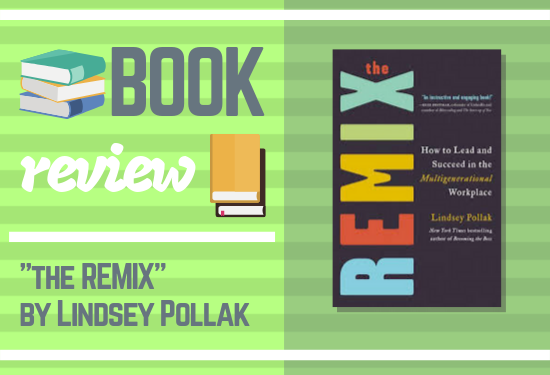
Book review
The book “the REMIX” by Lindsey Pollak deals with challenges and solutions in a multi-generational workspace. Me, being a Generation-Xer, working with a lot of Gen-Y and Millenials, read the book and had some real A-HA moments. Those moments make a book valuable (and allow a better understanding of your employees, colleagues and even kids).
The book is definitely worth reading. It is a good mixture of theoretical aspects and practice tips, examples and easy to read (especially for a non-native). Most impressive – for me – were the rules for remixers – people who pay special attention to the differences in expectations due to different ages / generations.
I’d definitely recommend the book to “new work” addicts and leaders with a “lean” or “agile” mindset.
Lindsey’s rules for remixers – something to keep in mind from “the REMIX” by Lindsey Pollak
#1 Stop the Generational Shaming.
“I see no hope for the future of our people if they are dependent on the frivolous youth of today.”
poet Hesiod, eighth century B.C.
There is no point in blaming other generations for whatever they do. Most likely it’s a form of socialization, a habit – and most likely it’s up to us to try to understand them better.
#2 Empathize.
Replace the blaming from #1 with empathy. Try to understand them. Why does this person of another generation act like she / he does? What’s the motivation behind? Try to see the world through the person of the other generation.
#3 Assume the Best Intentions.
Expanding on #2 Empathize, always assume the best intentions. This enables you to better understand the “why” behind somebody’s behavior. It also allows to explain the “why” behind your reasoning.
“It’s so annoying that the Millennials and Gen Zs on my team always wear earbuds in their ears at work.”
#4 Think “And”, Not “Or”.
If you ever come across to make a decision “the old way” or doing something “the new way” – never make this exclusive choice – combine the best of both.
#5 Remember That “Common Sense Is Not So Common”.
Don’t take your socialization as granted. Other people were raised in different economic conditions and in a different technology context.
Executive: But that was confidential!
Millenial: You never told us that!
Executive: I didn’t think I had to!
Traditionalists, Baby Boomers and Gen Xers have a different understanding of sharing information. For Millenials and younger information sharing is a natural habit and leads sometimes to misunderstandings.
#6 Don’t Change What Works.
Do not change what works in your leadership style and habits. Good leadership skills are inter-generational and independent of the age of people you’re working with.
#7 Be More Transparent.
Share information with your people, explain rationales behind decisions – make them understand to raise their understanding. Don’t be 100% transparent – but more transparent.
#8 It’s Okay if Everybody Wins.
Give more trophies for accomplishment. Celebrate, everybody wants to win, wants to be a hero. Don’t allow questions like “When there’s an intergenerational conflict, which generation should win?” – the right question would be: “How do we flex and adapt to one another so each person can have the opportunity to be part of the winning team?”
Classification of Generations
| Generation | Born | Size US | Commonly Cited Characteristic |
| Traditionalists | 1928-1945 | 47m | loyal, cautious, formal, proud |
| Baby Boomers | 1946-1964 | 76m | self-focused, competitive, optimistic, “forever young” mentality |
| Generation X | 1965-1980 | 55m | independent, cautious, skeptical, tech pioneers |
| Millenials | 1981-1996 | 62m | self-expressive, group oriented, purpose-driven, tech dependent |
| Generation Z | 1977-tbd | tbd | cautious, technology advanced, diverse |
To keep in mind from “the REMIX” by Lindsey Pollak
Lindsay cites an CMO’s answer on a panel discussion on the question “If you could go back to the very beginning of your career and give yourself one piece of advice, what would you tell your younger self? What do you most wish you had done then, knowing what you know now?”
The CMO said: “If I could go back to the beginning of my career and give myself one piece of advice, I would tell myself not to be so afraid. When I think back on my career – and I have been very successful and achieved a lot – but to this day I still think about and regret the jobs I didn’t apply for, the raises and promotions I didn’t ask for, the ideas I had and didn’t share. I don’t regret my mistakes or embarrassments of failures; what I regret are the times I held myself back.”
Find this book as well on my Agile Bookshelf.

